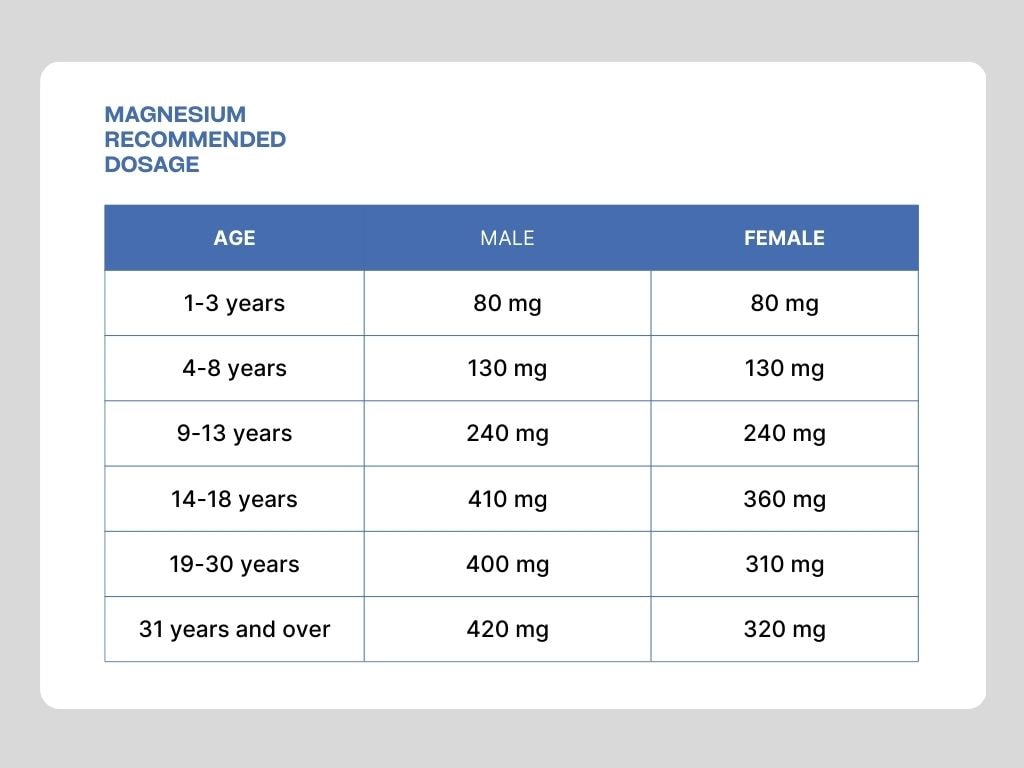
Our Blog
Magnesium for Tinnitus: What You Need To Know
Those who have dealt with tinnitus find its symptoms disruptive and disorienting. This ear condition, a perception of phantom sounds (ringing or buzzing) in one or both ears without an external source, affects around 25 million adults.
While there is no single cure for treating tinnitus, some people find relief through alternative treatments like magnesium supplements. A study on magnesium-dependent tinnitus found that magnesium supplementation led to a decrease in tinnitus severity. This same research showed that sufficient magnesium levels may help prevent noise-induced hearing loss, which sometimes magnifies tinnitus symptoms.

This link between magnesium and subjective tinnitus – where you’re the only one who can hear the ringing – remains an area of ongoing research. But here’s a deeper dive into what we know so far.
Why Magnesium is Necessary for Good Health
Magnesium is a mineral crucial for various bodily functions and is involved in over 300 different biochemical reactions in your body. Here’s why magnesium is so necessary:
Muscle and Nerve Function
Taking dietary supplements like magnesium ensures smooth communication between your muscles and nerves. It helps your muscles relax and contract properly, preventing cramps and spasms. It also transmits signals between nerve cells, allowing for proper coordination, reflexes, and brain function.
Energy Production
Magnesium is a key player in converting food into energy. It helps enzymes utilize glucose, the fuel your body runs on, for cellular energy production. Without sufficient magnesium, you might experience fatigue and tiredness.
Bone Health
This supplement is a crucial building block for strong bones. It helps your body absorb calcium, another essential mineral for bone development and maintenance. Adequate magnesium intake can contribute to better bone density and potentially reduce the risk of osteoporosis.
Blood Sugar Control
Magnesium is involved in regulating insulin sensitivity, a hormone that helps your body absorb sugar from the bloodstream. When magnesium levels are low, insulin sensitivity can decrease, potentially leading to prediabetes or type 2 diabetes.
Blood Pressure Regulation
Magnesium helps relax blood vessels, which can contribute to lower blood pressure. This is particularly important for people with hypertension or those at risk of developing it.
Magnesium also plays a role in various other bodily functions, including:
Headache relief
Mood regulation
Sleep quality
In ear health, magnesium has its place as a potential protector and supporter. Let’s explore how it might be relevant to tinnitus below.
Magnesium Dependent Tinnitus
Research finds that individuals with tinnitus often have lower serum magnesium levels than the general population. This suggests a potential relationship between magnesium deficiency and tinnitus. By replenishing magnesium levels, some researchers believe it could help calm these nerves and reduce tinnitus symptoms.

There are several ways magnesium may improve tinnitus symptoms. While it takes more research to definitively understand its effectiveness, its potential benefit for easing tinnitus symptoms is an interesting avenue for exploration. Read on.
How Magnesium Eases Tinnitus
Researchers believe abnormal activity in the dorsal cochlear nucleus, a brainstem area processing auditory information, might contribute to the perception of tinnitus. Dietary supplements like magnesium is capable of calming auditory signals and this abnormal activity. Auditory nerves transmit signals from the ear to the brain. When they’re overactive, it might be misinterpreted as sound, leading to the perception of tinnitus.
Replenishing magnesium levels could potentially calm these nerves and reduce the firing rate, leading to a decrease in tinnitus severity. Even if magnesium does not completely eliminate the underlying cause of tinnitus, it might still improve the perception of the condition. This can make it less noticeable and disruptive in daily life.
Healthy Levels Support Human Hearing
Adequate magnesium intake is essential for healthy hair cells in the inner ear, which are responsible for converting sound waves into electrical signals. Damage to these hair cells from loud noises or age-related degeneration can contribute to tinnitus. Some research suggests that magnesium might have a protective effect on these hair cells. By supporting their health, magnesium could potentially help prevent the development of tinnitus in some cases.
Helps to Correct Nerve Signalling in the Brain
Magnesium plays a role in regulating nerve impulses in the central nervous system, including the auditory system. Sufficient magnesium levels might act as a “signal boost,” ensuring proper nerve communication and potentially reducing the perception of tinnitus.
Boosts Vitamin D Production
Magnesium is necessary for the body to produce vitamin D, another crucial nutrient for ear health. Vitamin D deficiency has also been linked to tinnitus.
Important to Note:
Magnesium is not a cure for tinnitus.
It may not work as well for everybody.
May Eventually Prevent Noise-induced Hearing Loss
Here are some potential ways magnesium could be beneficial in preventing hearing loss caused by loud sound exposure:
Neuroprotective Effects: Studies suggest magnesium might have neuroprotective properties, meaning it helps protect nerve cells from damage. This could be relevant to hearing loss because the auditory nerve transmits sound information from the ear to the brain. If magnesium helps keep these nerves healthy, it might play a role in preventing hearing loss caused by nerve damage.
Reduced Free Radical Damage: Free radicals are unstable molecules that can damage cells throughout the body, including those in the inner ear. Magnesium acts as an antioxidant, helping to neutralize free radicals and potentially reduce their damaging effects on hearing.
Improved Blood Flow: Magnesium plays a role in regulating blood flow. Adequate blood flow is essential for delivering oxygen and nutrients to the inner ear, which is crucial for maintaining healthy hearing function. By supporting healthy blood flow, magnesium could potentially help prevent hearing loss associated with poor circulation.
How Much Magnesium Should You Take?
The appropriate magnesium intake for tinnitus varies between individuals. Factors like age, overall health, and dietary intake influence how much magnesium your body needs. It’s always best to start with the lowest dose and gradually increase it as tolerated.
This table provides the recommended daily dosage of magnesium, categorized by age and gender:

Complications of Taking Magnesium for Tinnitus
Always consult with your audiologist for tinnitus to determine whether your condition is suitable for supplemental magnesium. While magnesium is generally safe for most people when taken at recommended doses, there are some potential complications to consider, especially in relation to tinnitus.
Medication Prescriptions
Magnesium can interact with certain medications you are already taking, including antibiotics, diuretics, and some prescriptions used for heart disease. Discuss magnesium supplementation with your doctor to avoid any potential complications.
Side Effects
Magnesium is generally well-tolerated at recommended doses. However, exceeding those recommendations can lead to a magnesium overdose. This is more likely with high-dose supplements, but certain medications can also interact and increase magnesium levels in the body.
The most common side effects of a magnesium overdose include:
Diarrhea: This is the most frequent side effect. Magnesium pulls water into the intestines, loosening stool and causing diarrhea.
Stomach cramps: Magnesium can irritate the digestive system, leading to abdominal cramping and discomfort.
Nausea and vomiting: In some cases, a magnesium overdose can cause nausea and even vomiting.
The severity of these side effects can vary depending on the amount of excess magnesium ingested. Typically, mild to moderate diarrhea is the most common complaint. However, very high doses can lead to more serious complications, so it’s crucial to stick to recommended dosages and consult a doctor if you experience any concerning side effects.
These side effects typically resolve on their own once you stop taking magnesium. Below are some additional considerations.
People with pre-existing gut issues: If you have digestive conditions like Crohn’s disease or ulcerative colitis, you might be more susceptible to experiencing diarrhea from magnesium supplements.
Form of Magnesium: The form of magnesium supplement can also influence the likelihood of side effects. Some forms, like magnesium citrate, are more likely to cause diarrhea than others, such as magnesium glycinate. Your doctor can help you choose the right form based on your needs and sensitivity.
Possible Overdose
In rare cases, excess magnesium can lead to the following:
Muscle weakness: Magnesium is crucial for proper muscle function. In severe overdose cases, excess magnesium can interfere with nerve signals to muscles, leading to weakness and fatigue.
Irregular heartbeat (arrhythmia): Magnesium plays a role in regulating heart rhythm. Very high levels can disrupt this delicate balance, causing irregular heartbeat or arrhythmia. This can be a dangerous complication and requires immediate medical attention.
Slow breathing (respiratory depression): In extremely severe overdose cases, excess magnesium can impact the muscles involved in breathing, leading to shallow or slowed breathing. This is a life-threatening complication and requires emergency medical intervention.
Confusion or mental fog
Seizures (in very severe cases)
If you’re taking magnesium and experiencing any of the above signs and symptoms, seek immediate medical attention. Early diagnosis and treatment are crucial for a full recovery from a magnesium overdose.
Does the Medical Community Endorse Magnesium?
Many Canadian adults are magnesium-deficient (3 out of 10 people) and other essential nutrients like calcium, vitamin A, and vitamin D.
The endorsement of magnesium by the Canadian medical community is similar to the broader medical view, and still evolving. They recognize magnesium as an essential mineral for various bodily functions. However, the endorsement for specific uses of magnesium supplements can be more nuanced.
Research on its use for treating specific health matters, including tinnitus treatment, is ongoing. If you’re considering magnesium for ear health concerns, talk to your audiologist in Toronto. They can assess your individual needs, review current research on magnesium for your specific condition, and determine if supplementation is right for you.
Self-Management Techniques to Improve Tinnitus Symptoms
In the meantime, try to self-manage other tinnitus triggers like loud noise exposure and significant stress. Remember, magnesium may be a helpful addition to your tinnitus management plan, but always consult your doctor and explore other treatment options like natural treatments for tinnitus, sound therapy, hearing aids, or cognitive-behavioral therapy for a comprehensive approach to treat tinnitus.
Moreover, other underlying causes like ear infections can trigger tinnitus symptoms. It can damage the delicate structures within the ear, including the eardrum and inner ear, leading to hearing loss and tinnitus. In this case, seek a professional ear cleaning service and avoid aggressive ear cleaning methods.
